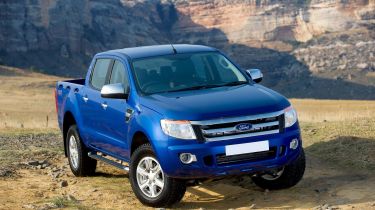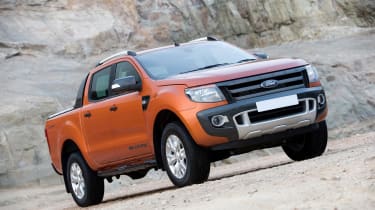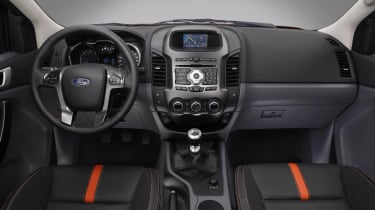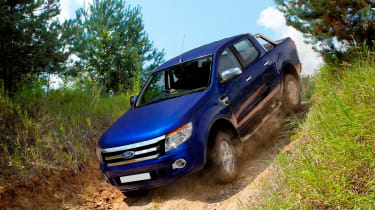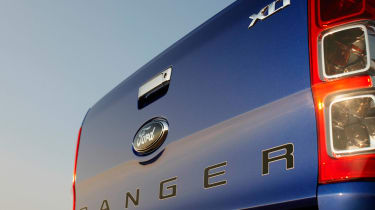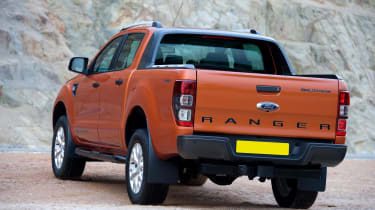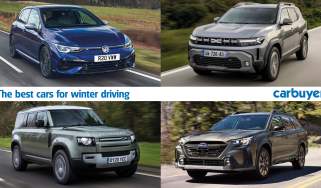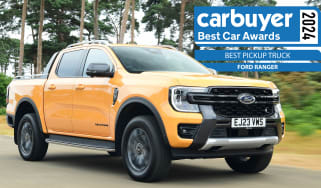Used Ford Ranger buying guide: 2011-2016 (Mk3)
The Ford Ranger Double Cab pickup truck combines SUV practicality with a large load bed and a car-like interior
There's strong demand for well-equipped pickup trucks in the UK, and the Ford Ranger is one of the front-runners in the class. The third-generation model is similar in philosophy to rivals such as the Mitsubishi L200, Nissan Navara and Volkswagen Amarok, as it offers rugged SUV-style looks and capability with a modern cabin that's loaded with kit.
As the Ford Ranger is classed as a commercial vehicle, it falls outside conventional company-car tax rules, so business users can get a lot more car for their money. But once they're on the used market, these upmarket pickups make for an interesting alternative to a conventional SUV.
Ford Ranger history
The third-generation Ford Ranger was launched in the UK in 2011, but it was radically different from the car it replaced. The second-generation was a commercial vehicle first and foremost, and it was only towards the end of its production run that Ford looked seriously at producing family-friendly versions.
For the Mk3, Ford designed it from the outset with family transport in mind. While the commercial versions are available in Regular, Super Cab and Double Cab bodystyles, it's the last one that provides the most practicality and therefore is the one being sold as a private vehicle.
More reviews
There are two engine choices in the Ranger, a 2.2-litre TDCi diesel and a larger 3.2-litre TDCi. Both have four cylinders and are offered with six-speed manual or automatic gearboxes.
From launch, the Ranger was offered in XL, XLT, Limited and Wildtrak (above) trims, all with varying amounts of standard kit. The top-spec Wildtrak featured kit such as leather seats, rear parking sensors and a camera, sat-nav and heated seats – although it only came with the larger 3.2-litre diesel.
The Ranger was updated at the start of 2016 with a corporate face similar in design to the new Ford Edge, while Ford's latest infotainment system was added to the cabin.
Which is the best Ford Ranger model for me?
Unless you're going to be carrying huge payloads or towing big trailers, the 2.2-litre TDCi diesel will have all the pulling power you'll need. In comparison, the 3.2-litre TDCi is thirsty, although there's no arguing with its added torque for larger loads.
The 2.2-litre TDCi has 158bhp, while the 3.2-litre TDCi has a substantial 197bhp. If you have a trailer, the 2.2-litre TDCi has a towing capacity of 1.8 tonnes, while the 3.2-litre TDCi can haul a massive 3.5 tonnes.
The regular and extended Super Cab versions of the Ranger are designed for commercial use, while the four-door Double Cab is the most versatile version that's geared towards family use. The basic XL and XLT are sparsely equipped, with only a basic DAB radio and air-conditioning.
In comparison, the Limited has extra chrome trim, climate control, larger wheels and rear parking sensors. The Wildtrak is very well equipped, with leather, a rear-view camera and bigger alloy wheels.
Running costs, maintenance & parts
The 3.2-litre TDCi has the power to impress, but the penalty is claimed fuel economy of 34mpg, while the automatic is even worse, at 31.7mpg, as it doesn't feature stop-start. The 2.2-litre TDCi has claimed economy of 39.8mpg, or 35.3mpg for the automatic version. Both models feature a large 80-litre fuel tank, though, so even the 3.2-litre automatic has a range of over 500 miles.
The Ranger's first scheduled service is after 12 months or 20,000 miles while the major service is after two years or 40,000 miles. Post-facelift cars only require an inspection after 12 months, and servicing occurs after 24 months or 20,000 miles.
The brake fluid should be replaced every two years, and the air-conditioning should be recharged at the same time. The coolant should be replaced after eight years, and the auxiliary drive belts need replacing after eight years or 160,000 miles.
What to look out for
The Ford Ranger has a rugged feel about it, and it's likely that some owners may not have looked after their cars as well as if it was a conventional car. What's more, the Double Cab measures nearly five and a half metres long, so it's not the most maneouverable car on sale. Scrapes to the bodywork are only of minor concern, but can be an early sign of abuse that may need investigating further.
The permanent four-wheel-drive system has a 4WD lock and low-range gears, and while the transmission isn't the most sophisticated, it's worth checking that the transmission changes modes smoothly.
If a Ranger has been used for towing, it may have added extra strain to the transmission, but with a 3.5-tonne maximum load for the 3.2-litre TDCi, you'll have to be going some to cause the car problems.
Ford offered a range of tonneau covers and truck tops to convert the pickup bed into a boot and give the Ranger added versatility. If you're looking at a car with a bed cover – a useful extra to have – then check that the cover has been installed correctly, as poor fitment can cause damage to the load bed. A protective plastic load liner is also a welcome addition to keep the pickup bed free from scrapes and dings.
Recalls
There have been two recalls for the Ranger Mk3. The first was in October 2012 for cars built between September 2011 and May 2012 and was related to the back-seat locking mechanism. The latch for the seat back may fail, resulting in the seat falling forward under braking.
The second recall was in February 2015, and affected cars with the 2.2-litre TDCi engine built from October 2014 to January 2015. A batch of faulty fuel-injector rails could result in the failure of a pressure valve in the system, and the potential of the engine stalling without restarting.
Alternatives
Upmarket pickups are in strong demand, and there are a number of worthy rivals for the Ford Ranger Mk3. The Mitsubishi L200 and Nissan Navara are on a par with the Ford, with similar towing ability and payloads, while standard kit on top-spec versions is generous, too. If you want towing power, the Navara was available with a V6 diesel for a brief period, and this can match the 3.2-litre TDCi Ranger for performance.
The Volkswagen Amarok is a pricier alternative to the Ranger, and has a more upmarket interior than its Ford rival, although it's not quite as good for towing or load-carrying.
Other options include the Isuzu D-Max, although it's more agricultural than the rivals mentioned above, while the Great Wall Steed is a Chinese-made pickup that's more like the Mk2 Ranger than the Mk3, although it's relatively cheap, so you get a lot of car for the money.
Verdict
The Mk3 Ford Ranger is an intriguing alternative to the SUV norm, although you really need to ask yourself if a pickup suits your needs. Depending on what you're carrying an how many passengers you have, it may be easier just to carry loads in the back seats, where they stay dry and locked away.
Still, the Ranger Limited and Wildtrak models offer a lot of car for the money, and there's nothing like driving a pickup to give you a sense of purpose and the feeling of rugged outdoor lifestyle. You'll also become popular with friends and family in need of a practical workhorse when they need to transport extra-large items, whether it's in the pickup bed or using the tow bar.

